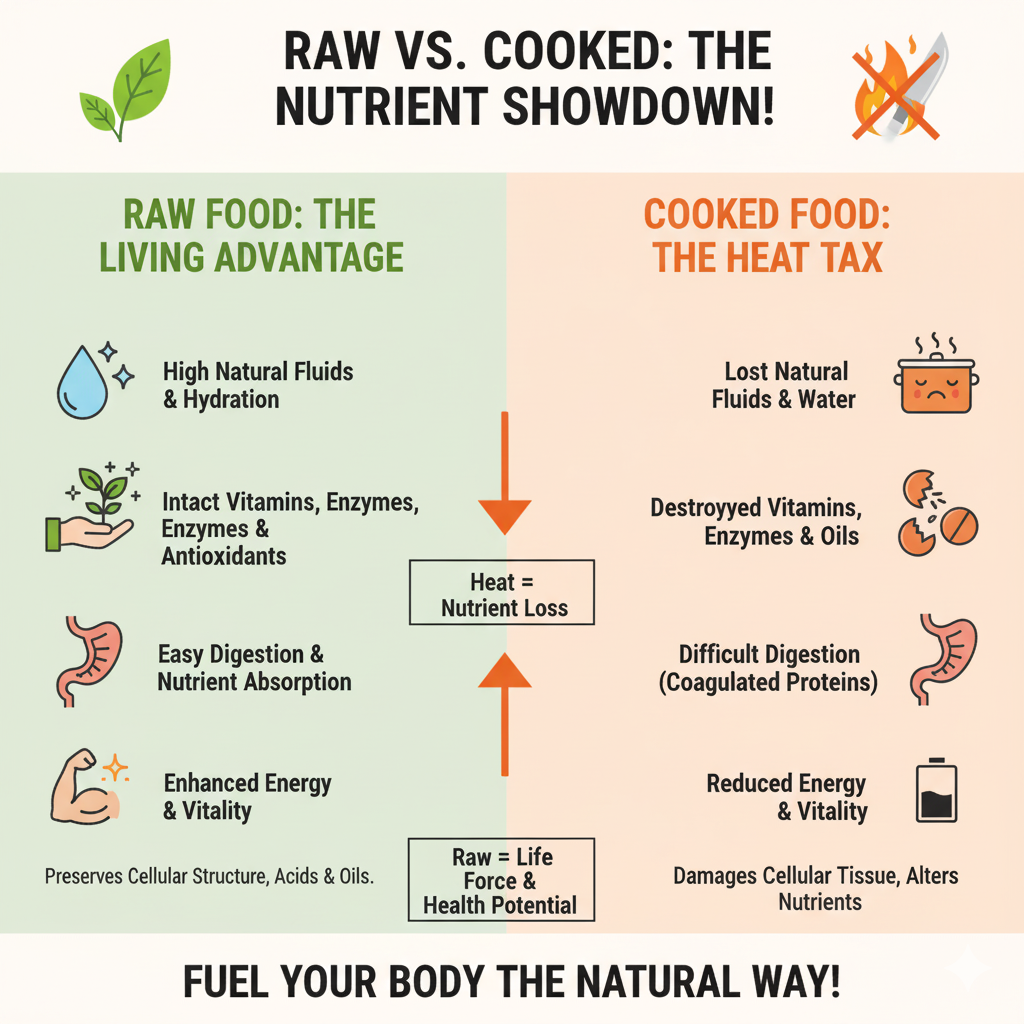The Health Impact of Cooked vs. Raw Food: What You Need to Know
Cooking food serves as our most common artificial treatment method—but few realize how profoundly it alters nutrition and vitality. The health impact of cooked vs raw food extends beyond flavor—it determines how much life your meals truly carry. Learning how proper food choices improve health can help you avoid common dietary errors and embrace the energizing raw food benefits that restore natural vitality.
The cooking process drastically affects food’s life and structure. It greatly lowers nutritional value, reduces digestive power, and diminishes vigor. This extensive article explores cooking’s negative health consequences. It also emphasizes the significant benefits of returning to natural, raw foods. For additional insights into dietary choices, you might find valuable information at reputable sources like the Nutrition.gov website.
Understanding the fundamental differences between cooked and raw foods and their impact on health.
Why Cooked Food Loses Nutrients—and How the Benefits of Raw Food Restore Them
Cooking destroys food’s inherent properties. It mostly removes natural fluids along with the attractive, stimulating scent. We may artificially supply water during cooking, but it lacks the important characteristics of water lost from the plant, especially after boiling.

Beyond losing water and scent, heat causes plants to lose important nutritional properties. Cooking destroys vital vegetable acids and oils. Oils are especially important for skeletal structure development. Furthermore, the process coagulates albuminoids, making them harder to digest. This combination of factors decreases food’s nutritional value. For more detailed information on nutrient preservation, consider resources like the World Health Organization’s guidelines on healthy diets.
During processing, the plant’s cellular tissue loses vitality. Ripe, uncooked fruits and grains, however, preserve their undamaged cellular tissue. They also retain high levels of water, sugar, acids, and electrical vitality. Heat significantly impacts the nutritional integrity and life force of food.
The Hidden Health Risks of Cooked Food (and the Raw Food Benefits You Miss)

Artificial heat causes major harm from cooked food. Heat creates increased activity through expansion, but this activity is not normal when we eat food hot.
What are the harmful effects of hot food?
Hot food particularly harms the sensitive nerves controlling taste and sensation. It severely damages taste and lip sensory nerves. They can no longer accurately assess food quality. As a result, appetizing foods may harm the body due to their natural properties and artificial heating. Similarly, heated food impairs the sense of smell. Research into oral health and diet can provide further insights; for instance, articles from the American Dental Association often discuss dietary impacts.
The harm extends to oral health. Hot food damages teeth by destroying enamel. This leaves teeth unsuited for mastication, causing food to pass unprepared into the stomach. Cooked food’s effect on associated nerves also injures the eyes. Those with systems weakened by hot, stimulating meals may experience weak, watery eyes, similar to those seen in regular drunkards.
The Gut Connection: Cooked Food and Digestive Issues
The stomach suffers most from cooked food. Heat from cooked food irritates, reddens, and abnormally compresses stomach coats, reducing their nutrient absorption capacity. This process disrupts healthy diet and digestion—a vital balance that supports energy, immunity, and overall wellness. Heat excites the blood, which rushes to the stomach and then rapidly goes throughout the body, often resulting in a flushed head appearance after eating.
Cooked food causes feelings of fullness and sluggishness. Hot food can also trigger excessive eating. This results in cessation of appetite, prompted by feelings of fullness and oppression, rather than natural satisfaction.
When you consume an apple after a usual hot dinner, the hot food weakens your stomach. In this weakened state, the fruit “lies like a stone” on the stomach, harming the weakened nerves. However, when gastrointestinal nerves are in excellent health, raw fruit or a vegan diet stimulates them for optimal digestion and absorption.
Some disorders are linked to digestive organ misuse from cooked meals. Common side effects include permanent weakening of the gastric nerves, stomach pain, and inflammation. For more information on gut health, you might consult resources like the National Institute of Diabetes and Digestive and Kidney Diseases, a leading authority on digestive health.
Raw Food Benefits: Boost Your Energy, Immunity, and Vitality Naturally
The most compelling benefits of a raw food diet become clear when you experience the sustained energy that cooked meals can’t provide. Consuming ripe, raw fruits, vegetables, and grains delivers a clean, vibrant power. These natural foods give the human body a rose sparkle. They provide the skin with an attractive transparency. They also give the entire muscular system great energy and flexibility.
Living foods, like fruits, specifically stimulate the mind to its full potential. Individuals who consume them report increased ability to study, do all mental tasks, and a strong desire to exercise. This contrasts distinctly with the sluggish sensation cooked foods cause.
An after-dinner nap will not help you overcome cooking’s damaging health effects. Rest cannot restore nutrients lost when cooking food. Nor can it supply the energizing drive that comes from eating uncooked foods in their natural state. Embracing the benefits of raw food doesn’t mean giving up comfort—it means rediscovering food as a living source of strength and natural healing. For a balanced life that integrates nutrition, mindfulness, and inner harmony, explore our guide on holistic health practices to support your journey toward full-body wellness.
Ready to feel the difference that nature intended? Start adding more fresh fruits and vegetables to your meals and experience the life-changing benefits of raw food — from sharper energy to effortless digestion. Every bite of living food fuels your vitality and restores balance from within. Begin your journey today toward a lighter, stronger, and more vibrant you — your health transformation starts with your next meal.
Frequently Asked Questions (FAQ)
What are the main health benefits of eating raw food instead of cooked food?
Raw foods—like fresh fruits, vegetables, and grains—retain their natural enzymes, vitamins, and antioxidants, which are often destroyed during cooking. This means better nutrient absorption, improved digestion, and higher energy levels. One of the biggest benefits of raw food is that it supports your body’s natural detoxification and cellular repair processes, helping you feel more vibrant and energized every day.
Is raw vs cooked food nutrition really that different?
Yes, the difference is significant. When heat is applied, many nutrients—including vitamin C, B-vitamins, and essential enzymes—are reduced or lost. In contrast, raw foods maintain their “living” nutritional integrity, offering more bioavailable nutrients per bite. Understanding raw vs cooked food nutrition helps you make smarter dietary choices that enhance immunity, digestion, and long-term wellness.
Can eating more raw foods improve digestion and gut health?
Absolutely. Raw fruits and vegetables provide natural fiber, water, and enzymes that promote smooth digestion and regular bowel movements. They also help maintain healthy gut bacteria balance, which supports immunity and reduces bloating. For deeper insights into how digestive processes and oral health work together, explore our detailed guide on the saliva and disease connection — an essential read for understanding how every part of the body contributes to overall wellness. If you’re seeking simple, natural ways to enhance digestion, increasing your intake of raw foods can deliver noticeable raw food benefits in just a few days.
